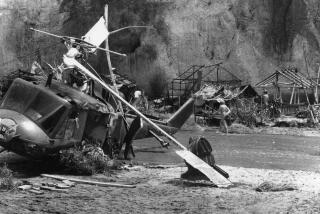Liability Experts Say It’s Like Any Other Crash
- Share via
Investigators’ belief that the crash of PSA’s Flight 1771 was the result of a criminal act will have no effect on potential liability suits by survivors, civil litigation experts agreed Thursday.
Since David A. Burke died in the crash, he cannot be prosecuted posthumously for murder or any other crime.
Even if he had lived and had been charged and convicted, civil lawyers say, hardly any attorney would bother naming him a defendant in a suit seeking monetary damages.
“Would you sue the wall?” snorted Ned Good, veteran Pasadena plaintiffs’ lawyer who represented several families of victims suing PSA after its 1978 San Diego disaster, and now is handling several cases against Aeromexico in the 1986 Cerritos airliner crash.
Persons convicted of crimes do have a civil liability to their victims or survivors, but suits against them are considered impractical because they usually have no money. Civil suits filed against Charles Manson over the murder of Sharon Tate and others and against convicted Hillside Strangler Angelo Buono, for example, languished in Los Angeles Superior Court with no action ever taken.
Even though Burke is believed to have left a six-figure estate gleaned from the sale of property, a few hundred thousand dollars would be meaningless in a plane crash case where the total paid to all victims’ survivors typically is in the millions.
“The little he had isn’t enough to cover one death,” said Good, “let alone 43.”
Daniel A. Cathcart of the Century City firm Magana, Cathcart, McCarthy & Pierry, which specializes in representing air crash victims, said Burke certainly would be the most culpable potential defendant in any suit over Monday’s disaster, but that suing him would be a waste of effort.
“He is certainly not insured for committing murder,” said Cathcart, accustomed to collecting six- and seven-figure awards from insurers of airplane manufacturers and airlines.
Traditionally, personal injury or wrongful-death suits stemming from events like airplane crashes use a scatter-gun approach to listing defendants, naming anyone or anything that could possibly have caused the injury. As Cathcart puts it, he likes to “invite everybody to the party.”
But lawyers have a new reason to scale down that laundry list of defendants.
Strategically, Cathcart said, the “deep pockets” initiative passed by California voters in 1986 assessing damages among all defendants according to proportion of liability would make a lawyer reluctant to name Burke as a defendant at all. A jury, he theorized, could conclude that Burke was 100% responsible for the crash and absolve PSA and its parent USAir, which would leave survivors with nothing.
George McDonald, who has defended airline insurer North American Insurance Co. and Ambassador Airlines, said prudent plaintiffs’ lawyers might name Burke as a defendant just to keep airline lawyers from placing all responsibility for the crash on “the empty chair” or the missing defendant. But at best Burke would be considered a “straw man defendant” from whom he “wouldn’t expect to collect a dime.”
Ignoring the assumed criminal liability of Burke as economically useless, attorneys said that civil suits over this crash will target the airline and its duty as a common carrier under California Civil Code 2101 to provide the “highest degree of care” to its customers.
Allowing anyone, even a former airline employee, to bypass a metal detector with a gun, the lawyers say, is a major failure to provide care for customers’ safety.
“What we have here,” said Cathcart, “is plain old unadulterated negligence.”
Attorneys predicted that lawsuits will also name as a defendant Allied Aviation Service, which operates the Terminal 1 passenger security check stations. Additional defendants would include anyone else--perhaps even the federal government--who approved security procedures or had anything to do with enforcing them.
Good said the airline would also be accused of negligence in its standard pre-employment investigation of Burke’s background.
More to Read
Sign up for Essential California
The most important California stories and recommendations in your inbox every morning.
You may occasionally receive promotional content from the Los Angeles Times.












